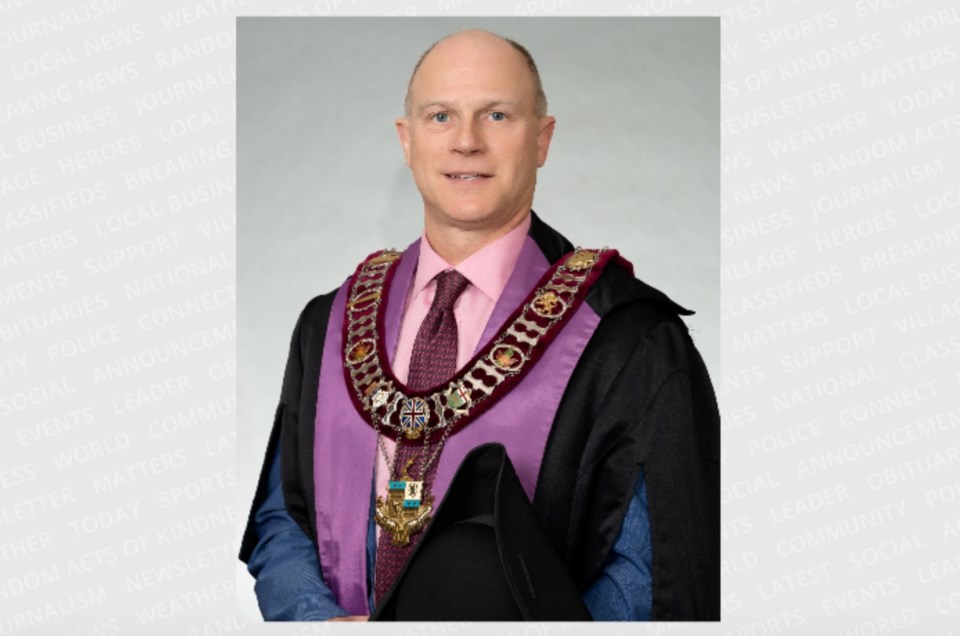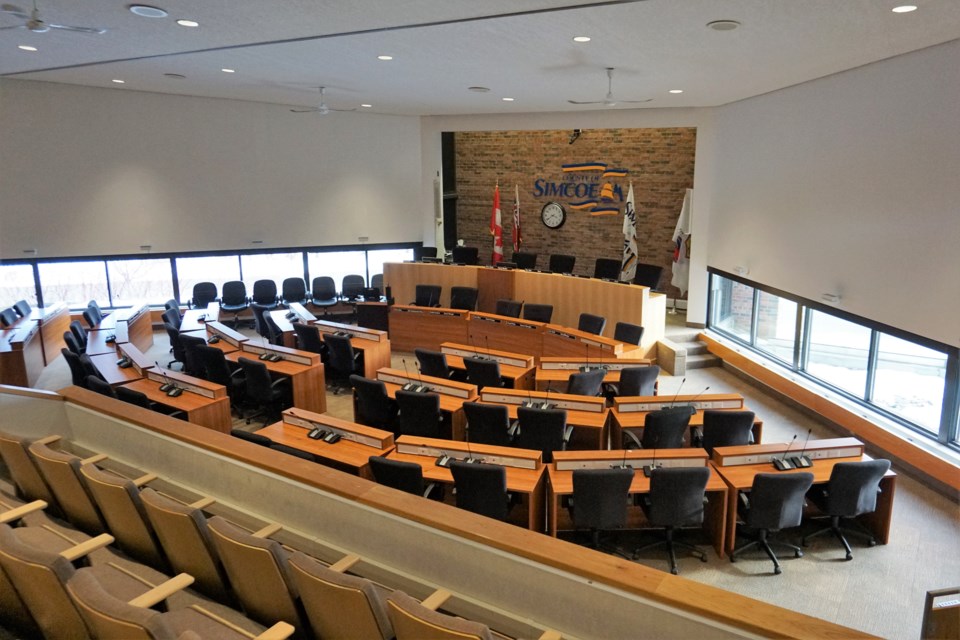The composition of the County of Simcoe council could be changing.
County council is currently comprised of the mayors and deputy mayors of each of the 16 towns and townships located within Simcoe County, for a total of 32 members.
That's expected to change next term, set to begin in the fall of 2026, after county councillors voted Tuesday in support of a motion that would maintain the 32-member composition, but include a new full-time warden position.
Councillors were presented with three options during the Oct. 8 council meeting, which also included reducing the number of council members to 16 plus a full-time warden for a total of 17 members and maintaining the status quo.
“I see our 32-member council as effectively working right now and I have not had anyone tell me that," Severn Township Deputy Mayor Judith Cox said during the lengthy discussion. "I don’t see the 32 members as status quo for the future. I see it as a full-time warden and a new beginning to continue working together, becoming stronger and supporting each other as our job as politicians continue to grow and change with our fast-paced growth in Simcoe County."
Cox said although she was against downsizing county council, she did agree a full-time warden was required given Simcoe County is being deemed as one of Ontario's fastest-growing areas.
“Democracy is based on representation by population and now we are going to reduce our politicians in half? We are municipal politicians who are closest to our constituents and they need to have their voices heard,” she said. “We have become a cohesive group of municipalities that work together across boundaries to provide services to our residents supported by all councillors and staff.”

Cox compared county council to ward councillors in her home municipality.
“Ward councillors' commitment is to their ward, so they wear two hats. When they come together, we do the best for our main municipality and work cohesively together," she said. "If we have a full-time warden, with the 32 members we have, I think we will continue to be an effective, cohesive government."
How county council is composed is something that comes up every term and routinely gets voted down, said Midland Mayor Bill Gordon.
“Notwithstanding the lack of leadership from the province and the feds of ‘walking the talk,’ it doesn’t give us a hall pass to do the same," he said. "I think we have the opportunity to lead by example. When we look at our peer regions and counties, we are by far one of the largest out there for the number of residents we serve.
"Reducing our size doesn’t diminish our ability to manage the budgets and the infrastructure needs and accurately and well-represent our residents,” Gordon added. “I think it just shows we are willing to save a few dollars because there will be savings. We are going to operate more leanly, enjoy the synergies and we are going to (better) mirror the size of representation for the number of residents we represent in the province.”
Nobody likes change, he said, but sometimes change is needed.
“All you have to do is look around and see that we are huge," Gordon said. "It’s comfortable to stay the same. Nobody likes change and I believe this could be the term that we could finally do it. For those that think the world will end and the sky will fall, that’s just not proven to be the case and that’s typically our innate reaction and fear of change.”
Innisfil Deputy Mayor Kenneth Fowler expressed concern about the additional workload, should the decision be made to reduce county council to 16 members.
“If we are going to knock our council down by half, we are going to double the workload for every mayor that sits or alternate that sits in this council chambers," he said. "That, on top of the mayoral duties that are in place, are something that people need to take into account.”
Fowler said the current system also means a variety of different backgrounds to better represent constituents.
“Our job is to represent the people. Our job is to speak for the people," he said. "Everyone from various backgrounds here can add that extra element that if we cut it in half will be removed and a perspective that could benefit the county as a whole would be taken off the table.”
Springwater Deputy Mayor George Cabral supported the option that would have seen council reduced to 16 members plus a full-time warden. He noted that had council always been smaller, he believes it would still be functioning the same way it does now.
“We don’t have alternates at our own municipal councils, but we do have alternates at county council," Cabral said. "I would suggest an alternate who is in that position, if they were serious about county council, would be following what was going on and be in a position to step up to the plate when it was needed.
“I am not suggesting that 32 doesn’t work," he added. "All I am saying is that I don’t see any issue with moving forward and finding out if 17 would work with the triple majority. There are a lot of checks and balances going forward … What are we afraid of? I don’t have any fear of this, because at the end of the day, it’s going to wash out the way the municipalities, this council and this public think it should.”
Following the discussion, a recorded vote was taken on the second option presented in the staff report — a 16-member council plus a full-time warden — however that was defeated with 87 opposed to 58 in favour, using a weighted system.
A second recorded vote was taken for the first option in the report, with a tallied vote of 82 in favour and 63 opposed.
Each municipality is entitled to a minimum of three votes plus one vote for each additional 2,000 electors above 5,000 electors. The number of votes for each municipality is split between the mayor and deputy mayor, with the mayor assuming the additional vote if the number is odd, according to the staff report.
Larger municipalities — such as Bradford West Gwillimbury, New Tecumseth and Innisfil — have more electorates and therefore are allotted more votes when council goes to a recorded vote.
Changes to council composition would be scheduled to take effect for the 2026-30 term and must have the related bylaw enacted by December 2025.
According to the staff report, a “triple majority” is required under the Municipal Act, which means before a county bylaw changing the composition of an upper-tier council it must receive: a majority of votes on county council in favour; a majority of lower-tier councils passing resolutions consenting to the bylaw; and the lower-tier councils consenting to the bylaw represent a majority of all electors in the upper-tier municipality.
A public meeting would be scheduled for council and the public to comment on a draft bylaw. Following the public meeting, a final bylaw would then be brought to council for approval. If approved, the triple-majority process would be initiated.



